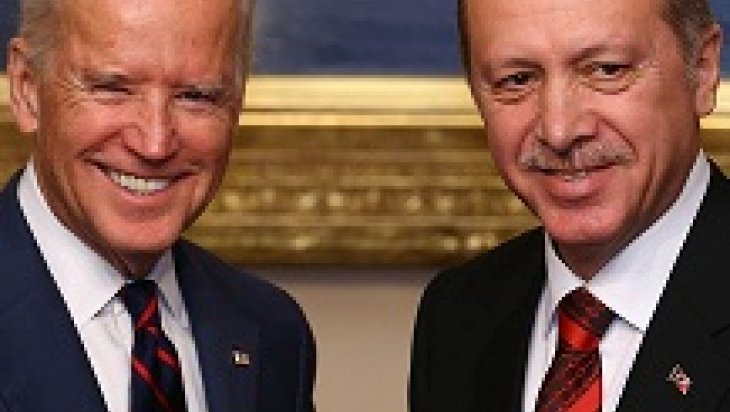Reading Turkey-Iraq Relations over Biden’s visit to Turkey

Joe Biden, Vice President of the United States, paid a visit to Turkey on January 23-24, 2016 and met with President Recep Tayyip Erdoğan, Prime Minister Ahmet Davutoğlu and members of the Parliament from various parties. The visit of Biden, who is known as the number one U.S. official in the issues of Iraq and Syria shows that the U.S. acted as a bridge between Turkey and Iraq for the Bashiqa crisis and a consensus was reached therefore.
As a matter of fact, one can claim that both Iraq and the U.S. are aware of Turkey’s influence in the region and its support against the ISIS. It is obvious that if Turkey is left out of the fight against the ISIS, it is not possible to reach an efficient and quick outcome. Actually, the developments in regional politics are the real reason behind Iraq’s reactions against Turkey.
Within the period after the ISIS’s capture of almost one third of Iraq’s territory, positive dialogue has been observed between Turkey and the new Iraqi government that was formed in August 2014, amidst the efforts for rebuilding the damage that the relations suffered between 2010 and 2014 during the second tenure of Prime Minister Nouri al Maliki. During the Iraqi Foreign Minister Ibrahim al Jafari’s visit to Turkey in November 2014, the sides have agreed upon a mutual understanding about the abolition of visas for diplomatic, service and special passports. Just after al Jafari’s, Prime Minister Ahmet Davutoğlu’s visit to Iraq on 20-21 November 2014 initiated a critical phase in Turkey-Iraq relations. Davutoğlu first visited Baghdad then went to Arbil. Except the then Prime Minister Recep Tayyip Erdoğan’s visit in March 2011 that included both Baghdad and Arbil, it is the first visit by a top Turkish official after almost four years to both Arbil and Baghdad. In addition, since Erdoğan’s March 2011 visit was the last official visit on the Prime Minister level, Ahmet Davutoğlu’s visit was regarded as a milestone for the bilateral relations. After Davutoğlu, Iraqi Prime Minister Haider al Abadi visited Turkey in December 2014 and the High Level Strategic Cooperation Council was held for the first time after 2009, ending the disruption in the relations. Yet, the regional problems hindered the development of Turkey-Iraq relations. Russia’s intervention in Syria in September 2015 for supporting Beshar al Assad, and the formation of Russia-Iran-Iraq alliance caused Turkey and Iraq to oppose each other. In Baghdad, a new operations center was formed by Russia, Iran, Iraq and Syria. Iran’s rising influence in Iraq due to the Shiite militia groups fighting against the ISIS has started to limit the maneuverability of Iraq’s foreign policy. Consequently, Iraq has been unable to form a foreign policy independent of russia and Iraq and the development of Turkey-Iraq relations was prevented. The first outcome of Iraq’s alliance with Russia, Iran and Syria is the incident about the Turkish soldiers in Bashika distric of Mosul, who were training the groups fighting against ISIS. Turkey’s redeployment and rearrangement in the Bashiqa camp, which has been operational since March 2015 with the consent of the Iraqi government, caused a backlash from Iraq, blaming Turkishsaldiers as invaders and demanding their total withdrawal. In addition, Iraq has filed a complaint at the United Nations (UN). the UN meeting on the agenda of Bashiqa on 19 December 2015 recommended the sides to maintain bilateral talks and reach a solution by themselves. After that no more developments took place on the Bashiqa issue, yet ISIS conducted two assaults against the camp.
With the visit of Biden, as a road map has been endorsed for the solution of the Bashiqa issue, the reinvigoration of Turkey-Iraq relations is once again possible. There are rumors that a consensus has been reached during Biden’s visit that the Bashiqa camp will be expanded in order to convince Iraq. Accordingly, the camp would be used by the U.S., NATO and the anti-ISIS coalition, yet nothing would change except its headsign. In addition, the Iraqi army will be permitted to appoint a representative to the international coalition.
As it is known, a coalition force was assembled in September 2014 led by the U.S., comprising omre than sixty countries including Turkey. In this context, the US, England, Germany, France, Hungary, Norway, Italy, the Netherlands, Denmark, Spain, Belgium, Portugal, Australia and New Zealand have been training the Iraqi forces against the ISIS in six bases all over Iraq (two in Baghdad, one in Arbil, and the bases of Al-Asad, Taci and Besmaya).
With the introduction of the Bashiqa base, Iraq will be hosting seven coalition bases. Therefore, one can argue that Turkey will have closer relations with the U.S. and the international coalition in the fight against the ISIS.
One can argue that Biden is acting on behalf of Iraq as well, since he visited Iraq before Turkey and constantly stresses the need to lessen Iraq’s concerns. Besides, no statement was made by the Iraqi government on this issue lately. It shows that the U.S. is disturbed by the pro-Russia and pro-Ian stance in Iraq’s foreign policy as well. If Iraq deviates towards the other axis in regional politics, it will effect not only Iraq but also Syria as well. That is to say, America’s policies towards the region will be damaged. Thus, good relations between Turkey and Iraq is benefitial for the U.S. as well. At this point, it is highly likely that the road map about Bashiqa will be accepted by Iraq and Turkey-Iraq relations will be reinvigorated.










